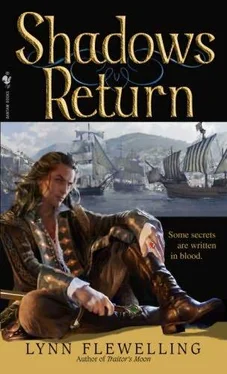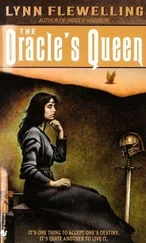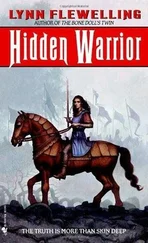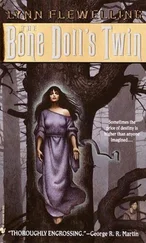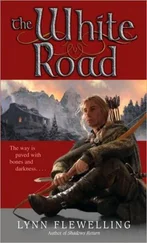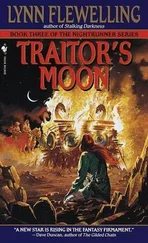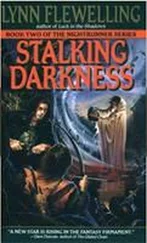“I knew nothing of it until you contacted me about all this. And if I knew nothing, then it is highly unlikely that anyone else does, with the possible exception of the rhui’auros at Sarikali.”
“Ah, yes. Your mysterious, mystic priests. Are they the keepers of your people’s secrets?”
The khirnari answered that with an enigmatic smile. “There are many stories about why Hâzadriël gathered her followers and fled north, though no one knows the truth, or so the rhui’auros would tell you. But some say that she was gifted with a vision by the bash’wai spirits who inhabit Sarikali.”
“Mystics and ghosts! My, but you are a colorful people.” Ulan’s smile disappeared. He did not move, but the air around Yhakobin suddenly felt cold and dense. “I meant that as a compliment, of course.”
“Of course.” Ulan kept him pinned with his sharp-eyed gaze a moment longer, then looked down at his wine.
Yhakobin relaxed slightly as the atmosphere returned to normal. “So, I will endeavor to make the rhekaro with what I have to work with, and then we shall see.”
“I should like to see your texts, which speak of this magic.”
Yhakobin nearly refused; no alchemist shared his precious store of knowledge, and most certainly not with an outsider. And he did already have the young Hâzadriëlfaie in hand. All the same, Ulan í Sathil was too powerful a man to trifle with. “Very well. Please wait here while I retrieve it.”
As he unlocked his workshop door, he glanced back suspiciously, but Ulan still sat at the wine table, gazing at the fountain or statuary now. After that little demonstration of displeasure, however, Yhakobin wondered if the man was somehow coercing him into revealing his precious texts. Safely inside, he went to one of the tables and placed a bit of sulfur in a crucible and poured a few drops of several tinctures over it, then drew the requisite symbols on the table. He lit the sulfur with a coal from the forge and watched the flame, which flared up yellow, then turned a deep green; Ulan was exercising no magic on him, or at least none he could identify.
Satisfied, he went to the small pavilion at the far end of the room and crawled inside to open the large casket hidden there. The lock opened at his touch, and he took out the lesser tome and carried it back to Ulan. He doubted the man, for all his apparent wisdom, knew how to read the Arcana.
“Here, Khirnari,” he said, opening the book to a chapter marked with a black ribbon. Ulan took the tome and slowly followed the tiny characters with a finger, nodding slowly. “According to this, the longevity properties are not predictable.”
“Most likely because of the differing distillation processes employed by the few alchemists who practiced this science. Each lineage has its own methodology, rather like the inherited magic of your people. And no one in those ancient times ever thought to use a half-blood, when the pure strains were so readily had.”
“The history of your people’s depredations on our shores is nothing to speak of lightly,” Ulan said quietly, and the air grew a little heavy again.
“Of course not, Khirnari. I only meant to give you an explanation of why my endeavors in this matter may be unpredictable. But rest assured, the purification and decoction of blood strains is a great strength of mine. And at the risk of seeming arrogant, I daresay you will not find another alchemist who is more adept at the art than I.”
“I do not doubt your expertise, Charis. If the process produces the elixir I hope for, then I will be pleased, of course. If it does something else, then you will of course share that knowledge.”
“Of course. And regardless of the outcome, I will continue to keep our bargain. Any member of the Virésse clan I find in the markets or households of Plenimar will be purchased-ransomed, that is-and returned to you.”
“And your traders will continue to have favored status in my ports, and in my fai’thast.”
Ulan rose and bowed to him. “Good night, my friend, and good luck.”
“Won’t you stay the night with us, Khirnari? My wife has prepared a banquet in your honor.”
The old Aurënfaie’s hesitation would not have been apparent to a man less astute than Charis Yhakobin. “I will be most honored to dine with you, but these old bones of mine will sleep better rocked by the tide in an Aurënfaie berth. One of the many prices of age, my friend. One becomes overly attached to the familiar in small things.”
“And great ones, as well.” It was no secret that the pact between Skala and the Gedre khirnari had hurt more than Virésse’s trade and shipping interests. It had hurt their pride. What Seregil í Korit’s role had been in that was unclear, but Yhakobin had been more than happy to benefit from the rift. If not for Ulan’s animosity toward the young Bôkthersan, Yhakobin might never have gained the prize he now had safely locked away in his cellar.
He let his gaze wander to the dark, slender figure standing at a respectful distance in the shadows and gave a slight nod to show that all was well. Yhakobin was a wealthy man, and a powerful one, but merciful when it suited him. He could afford to be generous now, especially to one who had brought him his heart’s greatest desire.
FOR TWO DAYS Alec was left in peace, but he was clearly being punished; his gaolers brought him nothing but water. They didn’t speak to him when they came with the pitcher, or to take away the pail, but no one abused him, either. He had no doubt, though, that he was being closely observed.
His belly ached and growled, but he’d known worse deprivations. By the second day he was a little light-headed, but the worst thing was the boredom. There was nothing to do but count the bricks in the floor and watch the patch of sunlight crawl across the wall. He’d tried to get up to the tiny window, but it was too high. Sitting in his nest of quilts, he spent hours listening intently, trying to imagine what lay beyond this room.
There were often footsteps in the corridor outside his door, and the muffled sounds of conversation. He couldn’t understand the words, but it sounded like servants’ talk. Occasionally he made out Yhakobin’s voice-a calm, even murmur that was always answered with respect.
Birdsong came in through his window, and the ordinary sounds of a household-footsteps, the clank of a pail, the sound of wood being split, the crowing of a rooster at daybreak, the occasional snuffle of a dog near his window, women’s voices, and the occasional laughter of children.
Just after dark the second day, his keepers came in carrying a lamp and a chair. Alec remained on his pallet as they set these things against the wall by the door, then stepped back to let in their master.
Yhakobin sat down and motioned to Ahmol, who carried in a wooden bowl and a small brown loaf. Alec’s mouth watered painfully as the smell of warm oat porridge drifted across to him. Instead of bringing them to Alec, however, Ahmol stayed by the door and looked to his master.
“How does this night find you, Alec?” Yhakobin asked, crossing his legs and smoothing the fabric of his dark robe over his knee.
The smell of the food made his traitorous stomach growl. “Well enough, Ilban,” he replied, respectfully dropping his gaze.
“Hungry?”
“Yes, Ilban.” There was no use denying it. He could see the game that was being played, but standing on pride and getting any weaker wasn’t going to get him anywhere.
“You’re more reasonable tonight. I’m glad.”
“Hunger is a good teacher, Ilban.”
Yhakobin nodded to Ahmol. The servant set the food down in front of Alec and went out, closing the door.
Читать дальше
